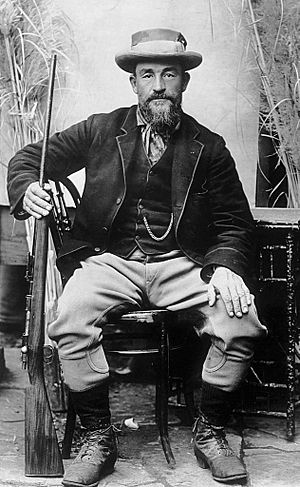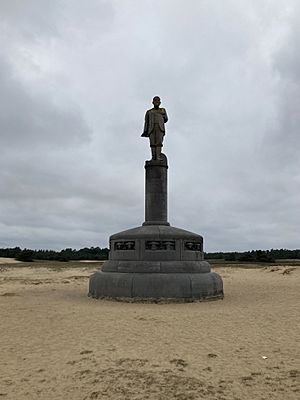Christiaan de Wet facts for kids
Christiaan Rudolf de Wet (born October 7, 1854 – died February 3, 1922) was a famous Boer general, a leader in rebellions, and a politician. He was known for his clever tactics during wars in South Africa.
Quick facts for kids
Christiaan Rudolf de Wet
|
|
|---|---|
 |
|
| State President of the Orange Free State Acting |
|
| In office 29 May 1902 – 31 May 1902 |
|
| Preceded by | Martinus Theunis Steyn |
| Succeeded by | Position abolished |
| Personal details | |
| Born | 7 October 1854 Smithfield, Orange Free State |
| Died | February 3, 1922 (aged 67) Dewetsdorp, Orange Free State Province, Union of South Africa |
| Nationality | Afrikaner |
| Spouse | Cornelia Margaretha Krüger |
| Children | 16 |
| Relatives | Carel de Wet (Grandson) Piet de Wet (Brother) |
| Profession | Farmer, Boer general, politician |
| Signature | |
| Nickname | The Fighting General |
| Military service | |
| Allegiance | |
| Years of service | 1880–1881, 1899–1902, 1914 |
| Rank | First Boer War
|
| Commands | Natal and Transvaal Kommandos |
| Battles/wars | Second Boer War
Maritz Rebellion
|
Contents
Early Life and Family
Christiaan de Wet was born on a farm called Leeuwkop. This farm was in the district of Smithfield in the Orange Free State. The Orange Free State was a Boer republic in South Africa.
He later lived in a town named Dewetsdorp. This town was named after his father, Jacobus Ignatius de Wet. Christiaan de Wet married Cornelia Margaretha Krüger. Together, they had 16 children.
A Brave Military Leader
Christiaan de Wet started his military career in the First Boer War (1880–1881). He served as a field cornet, which is a military rank. He fought in the Battle of Majuba Hill. In this battle, the Boers won against the British forces. This victory helped end the war. It also led to the Transvaal Republic getting its independence back.
After the First Boer War, from 1881 to 1896, he lived on his farm. He also became a member of the Volksraad in 1897. The Volksraad was like a parliament or government assembly.
The Second Boer War
In September 1899, the Second Boer War began. Christiaan de Wet and his three sons joined the war as ordinary citizens. He was part of the Heilbron kommando. They were sent to the border of Natal.
On October 11, 1899, de Wet was chosen as the vice-commandant of Heilbron. He took part in the fight at Nicholson's Nek on October 30. In this battle, many British soldiers surrendered. After that, he was involved in the Siege of Ladysmith.
In December 1899, de Wet was made a fighting general. He went to the Western frontier. There, he became the second-in-command to General Piet Cronjé. The British army began to advance in February 1900. They moved towards Kimberley. De Wet tried to stop them by attacking a supply convoy. But the British still reached Kimberley.
General Cronjé and 4,000 of his men surrendered at Paardeberg. Soon after, de Wet became the Commander-in-Chief of the Free State forces. However, they could not stop the British from taking Bloemfontein. Bloemfontein was the capital of the Free State.
Guerrilla Warfare Tactics
De Wet became famous for his surprise attacks. On March 31, 1900, he launched a successful attack at Sanna's Post. This was near Bloemfontein. A few days later, on April 4, he won another battle at Reddersburg.
Christiaan de Wet became known as a very strong leader. He was excellent at guerrilla warfare. This is a type of fighting where small groups use quick attacks and then hide. He kept winning battles and avoiding capture. His brother, Piet de Wet, was also a Boer general. Piet was captured by the British in July 1901. He then served with the British forces against Christiaan.
During the war, people admired de Wet's skills. A song was even made about him. It showed how difficult he was to catch.
De Wet played an important part in the peace talks of 1902. On May 30, 1902, he briefly became the acting State President of the Orange Free State. This happened because President Steyn was ill. De Wet was one of the leaders who signed the Treaty of Vereeniging. This treaty ended the war.
Political Life and Later Years
After the war, de Wet traveled to Europe with other Boer generals. They tried to change the peace terms, but they were not successful. De Wet wrote a book about his war experiences. It was called Three Years War.
In November 1907, he was elected to the first parliament of the Orange River Colony. He was also made the Minister of Agriculture. In 1908–1909, he was a delegate at the Closer Union Convention. This meeting helped create the Union of South Africa.
In 1914, de Wet was one of the leaders of the Maritz Rebellion. This was an uprising against the government. He was defeated by General Louis Botha on November 12, 1914. He was captured on December 1. De Wet was sentenced to six years in prison and a fine. However, he was released after one year. He promised not to be involved in politics anymore.
Christiaan de Wet's health slowly declined. He passed away on February 3, 1922, on his farm. General Jan Smuts, who was the Prime Minister, sent a message saying, "A prince and a great man has fallen today." De Wet was given a state funeral in Bloemfontein. He was buried next to President Steyn and Emily Hobhouse. They are at the memorial for Boers who died in British concentration camps.
On the 100th anniversary of his birth, a bronze statue of him on a horse was unveiled in Bloemfontein.
Legacy and Remembrance
Christiaan de Wet was a very important figure in South African history. He was known for his bravery and cleverness during the Second Boer War. Because of his actions, he is remembered in many ways. Monuments and statues honor his memory.
Images for kids
See also
 In Spanish: Christiaan de Wet para niños
In Spanish: Christiaan de Wet para niños


